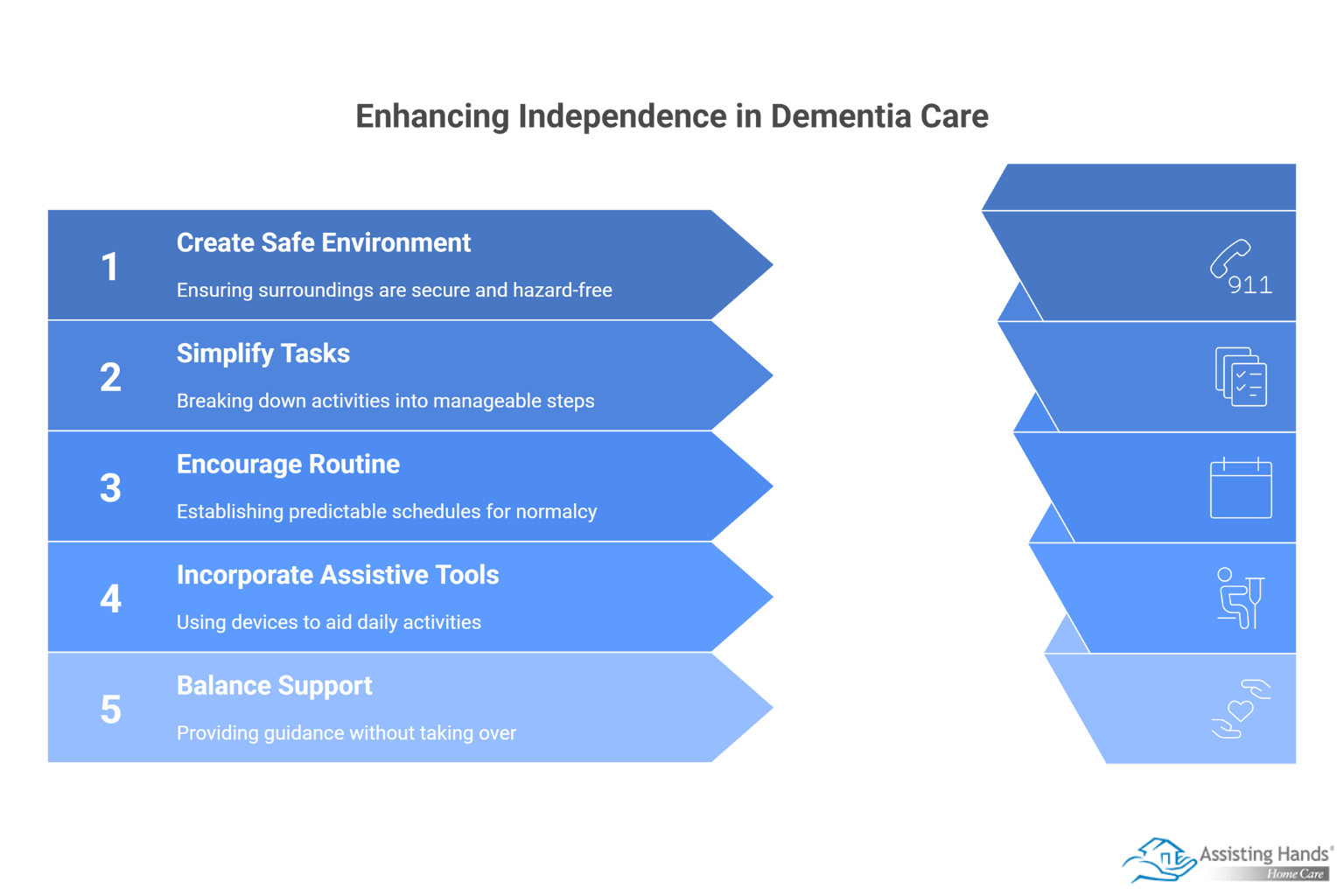
Table of Content
Promoting independence in dementia patients is a delicate yet vital part of their care. Empowering them to perform everyday activities enhances their sense of purpose and dignity while maintaining a level of engagement with their surroundings. With the right strategies and safety measures in place, caregivers can encourage independence while providing the necessary support.
Create a Safe Environment
Safety is the foundation of promoting independence in dementia care. Hazard-free environments allow dementia patients to confidently engage in daily activities. Here’s how you can ensure your aging loved one’s surroundings remain secure:
- Declutter and remove tripping hazards like loose rugs or cords.
- Install grab bars in bathrooms and hallways for added support.
- Use contrasting colors to differentiate objects (e.g., color-coded pathways or utensils).
- Ensure proper lighting to minimize confusion during activities.
A structured and secure setting provides the reassurance your loved one needs to function as independently as possible.
Caring for a loved one with dementia can be challenging, but compassionate help is available. If your senior loved one has been diagnosed with a serious condition and needs help with tasks like meal prep, transportation, bathing, and grooming, reach out to Assisting Hands Home Care, a leading provider of at-home care families can trust. We also offer comprehensive care for seniors with dementia, Alzheimer’s, and Parkinson’s.

Simplify Tasks
Complex or multistep tasks can overwhelm dementia patients, impacting their confidence and willingness to participate. Breaking down activities into simple, manageable steps makes it easier to complete tasks independently.
- Provide clear instructions in short, straightforward sentences.
- Offer visual cues or demonstrations for guidance, such as showing your loved one how to use an object.
- Reduce choices by offering two options (e.g., “Would you like to wear the red sweater or the blue one?”).
- Prioritize familiar repetitive tasks your loved one has performed before, such as brushing teeth or folding laundry.
Simplifying tasks preserves your loved one’s autonomy while reducing frustration.
Encourage Routine and Familiarity
Routines establish a sense of normalcy for individuals with dementia, fostering confidence in their abilities. Having predictable daily schedules can reduce confusion and stress while encouraging independence.
- Stick to a consistent schedule for meals, hygiene, and activities.
- Incorporate familiar activities or hobbies from your loved one’s past (e.g., gardening, painting, or baking).
- Use labeled drawers, cupboards, or picture charts to remind your loved one where items are stored.
- Allow sufficient time for your loved one to complete tasks at his or her own pace.
Through familiarity and routine, dementia patients can perform tasks with added ease.
A trained caregiver with knowledge about caring for seniors with dementia can be a fantastic resource for family members. Families looking for top-rated Columbus in-home care providers can reach out to Assisting Hands Home Care. From respite care to specialized Alzheimer’s, dementia, stroke, and Parkinson’s care, there are many ways we can make life easier for seniors and their loved ones.
Incorporate Assistive Tools
Assistive devices can empower dementia patients to perform activities safely and independently. Modern tools and adaptations cater specifically to the challenges they face, enhancing their ability to manage certain aspects of their daily lives.
- Adaptive utensils with easy-to-grip handles for meals
- Medication organizers or reminders for taking necessary medications on time
- Voice-activated devices or apps to provide guidance on daily tasks
- GPS trackers or wearable devices that offer safety and location monitoring
By introducing assistive tools, caregivers can support independence while ensuring safety.
Balance Support with Autonomy
While it may be tempting to step in and complete tasks for your loved one, assisting too much can make him or her feel dependent or reduce the motivation to try. Providing just the right amount of support allows your loved one to retain autonomy and self-worth.
- Offer guidance without taking over (e.g., guiding your loved one’s hand to a utensil instead of feeding him or her).
- Encourage trial and error by giving your loved one the freedom to attempt tasks without judgment.
- Be patient and encouraging, acknowledging every small success.
- Step in only when needed to avoid risks or unsafe outcomes.
Balancing support with independence fosters confidence and preserves dignity.
Aging in place can present a few challenges for seniors living with dementia. However, they can still live independently at home with the help of professional dementia care. Columbus families can rely on Assisting Hands Home Care to provide their elderly loved ones with mental and social stimulation, timely medication reminders, assistance with meal prep, and much more. Our caregivers are available around the clock to help your loved one live a happier and healthier life. Schedule a free in-home consultation by giving us a call today.






